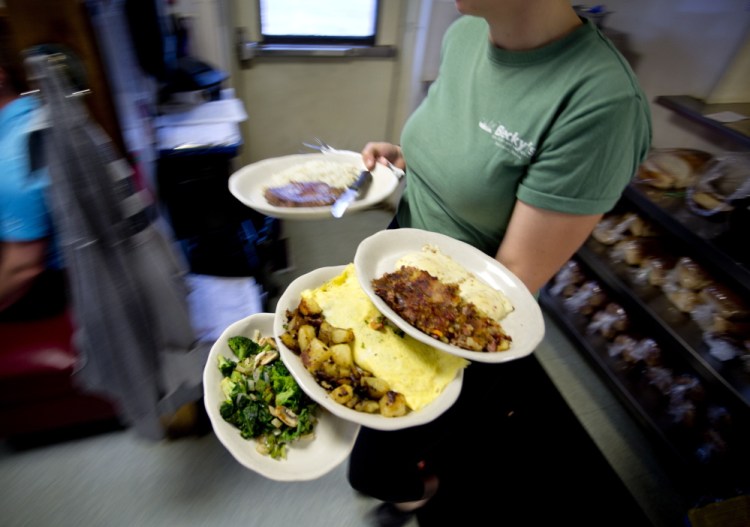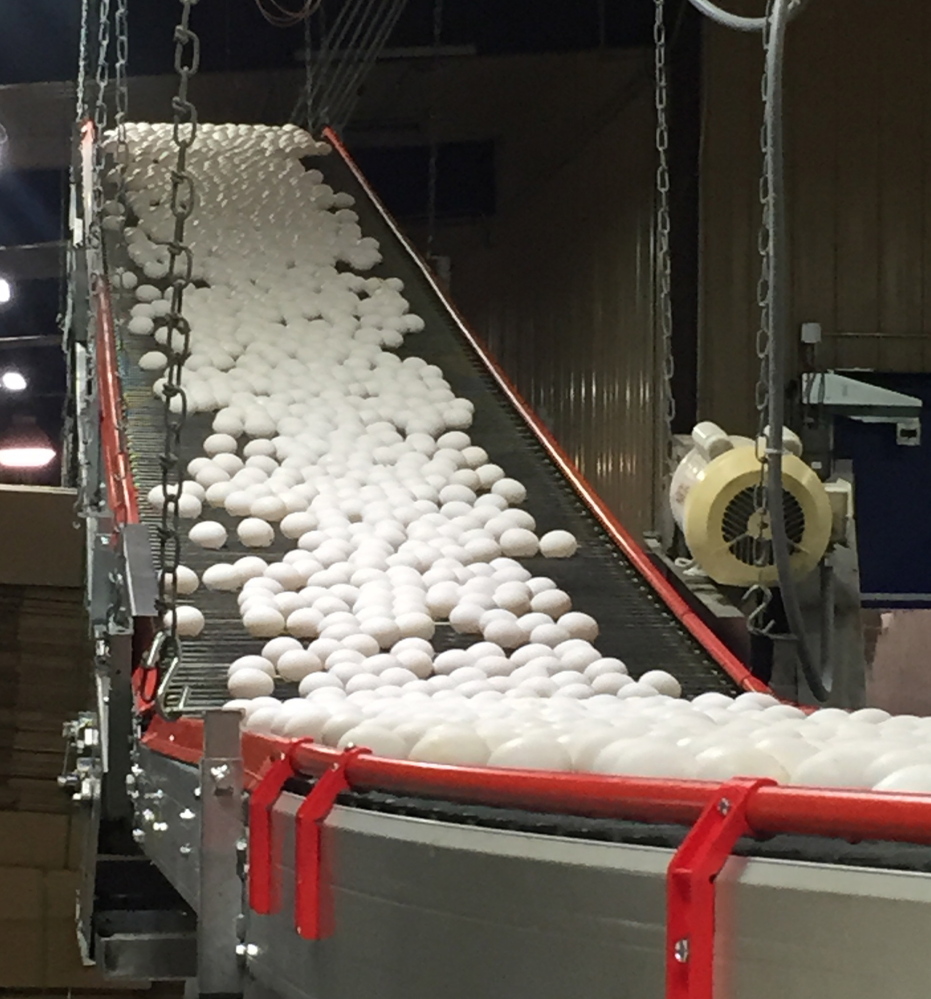A shortage of eggs in some parts of the country caused by an outbreak of avian flu has started to affect Maine businesses and consumers through increased prices for eggs and the products that contain them.
The price of eggs has “skyrocketed” in the past few months as the supply has tightened around the country, said Zack Rand, kitchen manager at Becky’s Diner on Portland’s waterfront. The diner buys eggs in cases of 180.
“As of a couple months ago we were getting a case for between $25 and $28, and those prices at this point have jumped to $40 a case,” Rand said.
The roughly 50 percent increase translates to a per-egg price jump of only about 8 cents – from 14 cents to 22 cents – but that adds up to about $120 a day at a place like Becky’s, which goes through as many as 1,500 eggs daily.
“You map that out over a couple weeks and you’ve added $1,000 to $2,000 to your food costs,” Rand said.
Tom Manning, owner of the Miss Portland Diner on Marginal Way, reports a similar increase in the wholesale price for his eggs. He wouldn’t offer specific figures, but said the price he’s paying for cases of eggs “has pretty much doubled” in the past few weeks.
Manning first heard from his distributors about the coming price increases about three weeks ago, he said. He’s also been told that he could see price increases for other food products that contain eggs, including ice cream, mayonnaise and salad dressings.
NO VIRUS SEEN IN NORTHEAST – YET
Rand and Manning are victims of a textbook case of supply-and-demand economics.
The first avian influenza case was reported in Oregon in December 2014. Since then, the outbreak has affected 46 million chickens and turkeys, and forced the slaughter of more than 40 million egg-laying birds. The virus has not been detected in the Northeast, and the region is producing plenty of eggs.
The Maine Poultry Growers Association has 45 members, about half of which produce eggs, said Gary Balducci, the association’s president and owner of Wishing Well Acres farm in Edgecomb. They all sell into the local market and haven’t been affected by the national shortage, Balducci said.
Maine hens laid about 84 million eggs in April 2014, the most recent available data, which include eggs for eating and eggs that hatch into chicks for poultry farmers.
Attempts to reach Maine’s lone major commercial producer, the former DeCoster egg farm in Turner, were unsuccessful. Moark LLC, a subsidiary of Minnesota-based Land O’Lakes Inc., took over those operations in 2011.
EGG PRODUCTION FALLS BY 45 MILLION
While Maine producers appear to be safe, the tightening supply in places such as Iowa, which has been hit hard by the virus, has increased egg prices there, creating a ripple effect throughout the country.
The Washington Post estimates that 10 percent of the entire U.S. egg supply has been affected by the avian flu outbreak.
According to the U.S. Department of Agriculture, the number of table eggs produced in the country dropped by roughly 45 million over the course of the past year, from 7.16 billion in April 2014 to 7.11 billion in April 2015.
Buyers of organic and cage-free eggs, which are already sold at a premium, have yet to feel the impact, said Greg Mitchell, a co-owner of the Palace Diner in Biddeford. Mitchell said his diner sources all its eggs from Nellie’s, a cage-free operation in New Hampshire, and has not seen any increase in the cost of its eggs. However, his distributor has warned him about a potential increase of 25 percent on products that use eggs.
“It’s one of these trickle-down effects,” he said. “For a restaurant like us, the concern isn’t the egg itself. We use eggs in so many different things … there are very few items in our kitchen that don’t use eggs. It’s kind of like the price of water going up. It affects everything.”
Despite the increased costs, neither Becky’s nor Miss Portland Diner is passing those costs along to consumers – yet.
“I’m going to try to eat it as much as I can because this is normally how this business works,” Manning said, referring to the price volatility of various foods. “Our menus are out and it’s not like we can turn around and start jacking all our prices up.”
Rand agreed.
And, diners being diners, there’s not much that can be done about it.
“It’s not an item we can take off the menu. It’s not an item we can cut back on,” Rand said. “At this point it’s so early in the prices jumping and all the news stories, you just kind of have to say, ‘We need to bite bullet’ ” and hope egg prices go back down, he said. “There are always ebbs and lows in every food product.”
While restaurants and other commercial users of eggs are starting to feel the pinch, consumers have so far been unaffected. Texas’ largest grocery store chain, H-E-B, made headlines recently for limiting its customers to three cartons of eggs, but there isn’t expected to be a shortage in Maine.
Hannaford Supermarkets sources most of its eggs from the Northeast and hasn’t had a problem securing them, said spokesman Eric Blom.
“So we’re not anticipating any supply issues for customers and we’re not contemplating doing any kind of limits on what people can purchase,” he said.
Prices have increased slightly, though Blom declined to say by how much.
Amy Crosby, marketing team leader at the Portland Whole Foods, said there have been no price increases at the store level. Attempts to contact a spokesperson at Shaw’s were unsuccessful.
In the Northeast, the average grocery store price of conventional, brown, grade A, large eggs in early May 2014 was $1.69 for a dozen, according to the U.S. Department of Agriculture. This May 22, the average cost was $1.88, a difference of about 11 percent. The agency doesn’t provide Maine data on egg prices.
Manning said his greater concern is how long the egg shortage will last. If the prices keep rising and the strain on the supply continues for an extended period, he’d have to reconsider the Miss Portland’s menu.
“I’m not saying I’m going to raise prices,” he said. “It just creates a bigger challenge if there are long-term impacts.”
Dustin Voter, procurement manager for Native Maine Produce and Specialty Foods, one of Manning’s distributors, has heard that it could take at least two years before the number of egg-laying hens returns to its pre-virus level.
FARMERS URGED TO PROTECT FLOCKS
Even though the avian flu hasn’t been detected anywhere in New England, it could spread to the region, said Michele Walsh, Maine’s state veterinarian.
The flu strain seems to be carried by migrating water fowl, so Walsh is warning Maine’s chicken and turkey farms to take steps to protect their flocks from wild birds and other potential contaminants.
Balducci, at the poultry growers association, noted that Maine’s small chicken farms could be especially susceptible because so many are free-range flocks, which are more likely to come into contact with wild birds.
Walsh said the state has been preparing for the arrival at some point of this “particularly virulent” strain of avian flu since the outbreak in December 2014.
“The question is when,” she said.
Send questions/comments to the editors.





Success. Please wait for the page to reload. If the page does not reload within 5 seconds, please refresh the page.
Enter your email and password to access comments.
Hi, to comment on stories you must . This profile is in addition to your subscription and website login.
Already have a commenting profile? .
Invalid username/password.
Please check your email to confirm and complete your registration.
Only subscribers are eligible to post comments. Please subscribe or login first for digital access. Here’s why.
Use the form below to reset your password. When you've submitted your account email, we will send an email with a reset code.